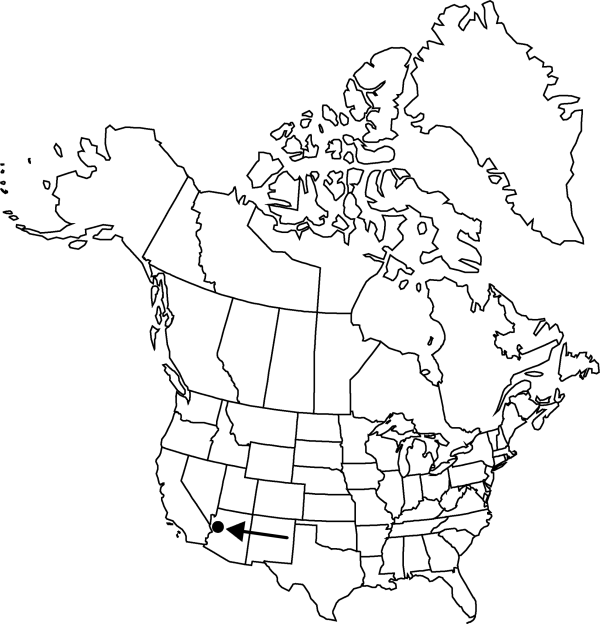Difference between revisions of "Cylindropuntia abyssi"
Cactaceae 1: 184. 1958.
FNA>Volume Importer |
imported>Volume Importer |
||
| (3 intermediate revisions by 2 users not shown) | |||
| Line 8: | Line 8: | ||
}} | }} | ||
|common_names=Peach Springs cholla | |common_names=Peach Springs cholla | ||
| + | |special_status={{Treatment/ID/Special_status | ||
| + | |code=E | ||
| + | |label=Endemic | ||
| + | }} | ||
|basionyms={{Treatment/ID/Basionym | |basionyms={{Treatment/ID/Basionym | ||
|name=Opuntia abyssi | |name=Opuntia abyssi | ||
|authority=Hester | |authority=Hester | ||
| + | |rank=species | ||
|publication_title=Cact. Succ. J. (Los Angeles) | |publication_title=Cact. Succ. J. (Los Angeles) | ||
|publication_place=15: 193, fig. 94 (upper left, bottom). 1943 | |publication_place=15: 193, fig. 94 (upper left, bottom). 1943 | ||
| Line 39: | Line 44: | ||
-->{{#Taxon: | -->{{#Taxon: | ||
name=Cylindropuntia abyssi | name=Cylindropuntia abyssi | ||
| − | |||
|authority=(Hester) Backeberg | |authority=(Hester) Backeberg | ||
|rank=species | |rank=species | ||
| Line 53: | Line 57: | ||
|publication title=Cactaceae | |publication title=Cactaceae | ||
|publication year=1958 | |publication year=1958 | ||
| − | |special status= | + | |special status=Endemic |
| − | |source xml=https:// | + | |source xml=https://bitbucket.org/aafc-mbb/fna-data-curation/src/2e0870ddd59836b60bcf96646a41e87ea5a5943a/coarse_grained_fna_xml/V4/V4_218.xml |
|subfamily=Cactaceae subfam. Opuntioideae | |subfamily=Cactaceae subfam. Opuntioideae | ||
|genus=Cylindropuntia | |genus=Cylindropuntia | ||
Latest revision as of 21:57, 5 November 2020
Trees and shrubs, openly branched, to 1 m. Stem segments somewhat detachable, 8–14 × 1.8–2.5 cm; tubercles prominent, 0.6–1.5 cm, moderately broad; areoles elliptic, 5–7 × 2.5–3.5 mm; wool white to gray. Spines in brushlike clusters of 10–15 per areole, flexible, whitish to yellowish tan, aging gray; abaxial ones erect to descending, recurved, angularly flattened to flattened, sometimes twisted, the longest 23–38 mm; adaxial ones ascending, erect, divergent, terete to angularly flattened basally, the longest 18–32 mm; sheaths silvery white. Glochids in inconspicuous small adaxial tuft, pale yellow, 0.5–1.5 mm, few much longer and scattered along periphery of areole. Flowers: inner tepals pale yellow to greenish yellow, spatulate, 15–20 mm, apiculate; filaments yellow; anthers yellow; style off-white; stigma lobes yellowish. Fruits green becoming dull yellow, dry, tuberculate, spineless or with 1–2 short spines; tubercles subequal in length; umbilicus deep, 7 × 15–18 mm; areoles 16–24. Seeds tan, slightly angular and warped, 3–4 × 3.2–3.5 mm; girdle smooth. 2n = 22.
Phenology: Flowering spring–early summer (Mar–Jun).
Habitat: Desert scrub, limestone ledges and crests
Elevation: 500-800 m
Discussion
Cylindropuntia abyssi is tentatively viewed as a narrow endemic relict in Peach Springs Canyon, Mojave County, Arizona, but may well be a persistent hybrid derivative, most likely involving C. bigelovii.
Hybrids between Cylindropuntia abyssi and C. acanthocarpa have a shrub habit, long-divergent and loosely sheathed spines, and more elongate tubercles than C. abyssi.
Selected References
None.
